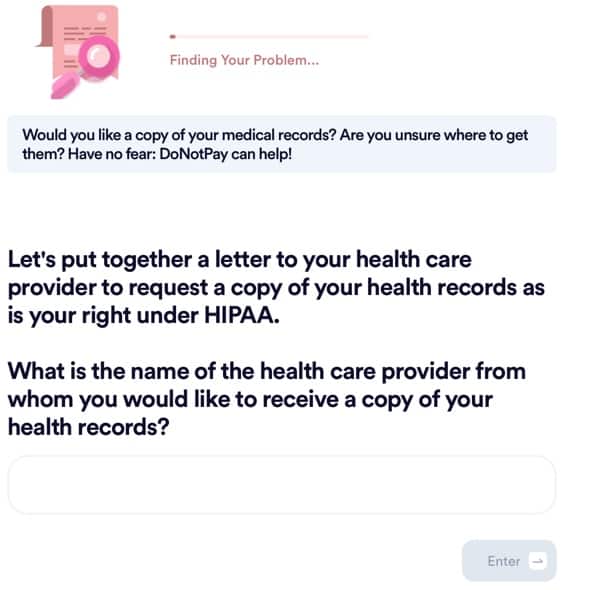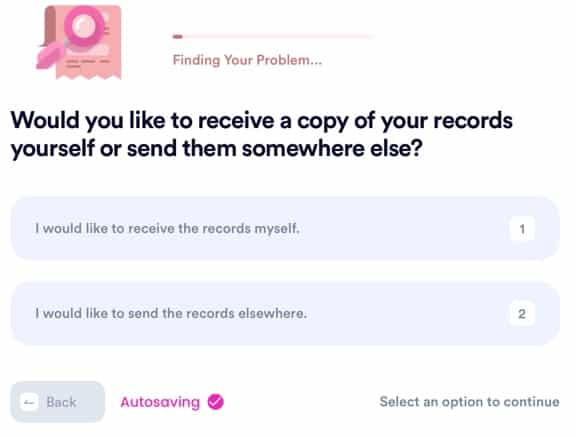Everything You Should Know About Eisenhower Medical Records
One component of 1996's Health Insurance Portability and Accountability Act (HIPAA) is an individual's right to access their own medical records. You may want to follow the history of an illness, evaluate care, or just keep track of your health. The beauty of HIPAA is that you don't need a reason to request your medical records; it's your right.
Eisenhower Medical Records Department provides information about how to access your chart and other key records. However, it can be a time-consuming and frustrating process. Fortunately, DoNotPay has the necessary experience to create a concise and effective letter requesting the release of your . We streamline the process for you, so you can better manage your own health care.
HIPAA and Your Right to Access Health Information
An individual's right to access health information as stated in 45 C.F.R. § 164.524 (2022) includes paper and electronic records. Documents may come from several sources, including:
- Health care provider's notes
- Medical test results
- Lab reports
- Billing information
Adult Patients Can Sign a Medical Release to Allow Medical Record Access
Under HIPAA, you can view your reports, and you may also designate others' access to your health care accounts. It's important to read and understand to whom you're allowing access when you sign medical release documents. Some individuals and organizations who could obtain your medical records include:
- Patient's parent or guardian
- Advocate or caregiver who has written permission
- Primary healthcare provider
- Life insurance companies
- Hospitals
- Labs
- Nursing homes
- Rehab centers
- Billing providers
- Mobile apps used to monitor diabetes or heart health
Some Medical Records Have Release Restrictions
While you have the right to view most of your health information, there may be instances when access is denied. Such circumstances generally include:
- Documentation used in a lawsuit
- Mental health records
- STDs
- Drug and alcohol rehab
DoNotPay can help you navigate the complexities of accessing health records online and requesting paper documents.
How to Get Electronic Copies of Your Eisenhower Medical Records
In an effort to help individuals make informed decisions about their health care treatment, HIPAA allows access to electronic medical records and paper documentation.
Many health care providers and medical facilities offer their patients online portal access. Enter your information online at the Order My Records form and submit it.
Eisenhower Medical Request Forms
- Access Eisenhower Health myChart if you have a current account with the medical center.
- Complete the Eisenhower Health myChart Proxy Access Authorization Form to allow another person or entity access to your records.
- The Authorization for Release of Protected Health Information identifies which records you want and to whom they should be released.
- The Autorización para Liberar Información de salud protegida is the Spanish version of the authorization form.
What to Include With Requests
If you require records from 2006 or want a paper copy, you can also request your records in writing. When requesting your documents whether by email or traditional mail, you must include the following information:
- Patient's full name, including any names previously used
- Social Security number
- Your account or ID number
- Date of birth
- To whom the records should be released
- Current contact information:
- Address
- Phone number
- Reason for the request, such as a matter or personal use
- Which records you're requesting, such as specialist visits or hospital stay
- How you'd like the records delivered
- Your initials on the release of sensitive information like psychiatric or substance abuse records indicating you acknowledge their release
- Your signature
Verification of an Authorized Representative
All requests by an authorized representative for the patient must be accompanied by one of the following:
- Personal representative designation acknowledging the individual has the right to act on the patient's behalf.
- guardianship documents.
- Health care power of attorney or advance directive when patients are unable to make their own decisions.
When requesting medical records for a deceased patient, you must include evidence that you're an executor of the estate or next of kin and a copy of the death certificate.
Eisenhower Medical Records Contact Information
| Address | 39000 Bob Hope Drive,
Wright Building, Suite 104 Rancho Mirage, CA 92270 | |
| Webpage | Eisenhower Medical Records Department | |
| Phone | (760) 773-1211 | |
| Fax | (760) 773-1211 | |
| Separate Phone Numbers | Eisenhower Occupational Health | (760) 777-7710 |
| Eisenhower Imaging Center | (760) 837-3876 | |
| Hours | Monday - Friday | 8:00 am to 4:00 pm |
You may request Eisenhower medical records on your own. However, completing the appropriate paperwork and connecting with the right departments can be time-consuming and frustrating. DoNotPay offers a streamlined process to access and request medical records.
How Much Does It Cost to Obtain Medical Records?
While Eisenhower Medical Center doesn't indicate whether it charges a fee or not, the standard California costs for retrieving medical records may apply:
- First-time copies: $0.025 per page
- Additional fees and costs:
- $0.50 per page of microfilm
- Cost for x-ray reproduction
Solve the Request For Medical Records With the Help of DoNotPay
Although Eisenhower Medical Center provides several avenues to , the process can often be tedious. If you omit one piece of information, it stops the request, and you need to start it all over again.
Fortunately, DoNotPay offers you the benefit of its experience by streamlining the medical record request steps for you.
How to Request Medical Records Using DoNotPay
DoNotPay has seen these requests before and knows how to write your health care provider a simple, clear, and effective letter that will get your legally guaranteed health records for you in no time.
To request your records:
- Look up medical records on DoNotPay’s website.

- Enter the name of the health care provider you’d like to receive medical records from.

- Answer a few questions about your provider and where you’d like to send the records.

DoNotPay Works Across a Wide Range of Companies, Entities, and Groups With the Click of a Button
DoNotPay can help you manage medical record requests from a variety of medical facilities and organizations, including:
- Mercy Health
- Baptist Health
- Cleveland Clinic
- Kaiser Permanente
What Else Can DoNotPay Do?
DoNotPay isn't limited to assisting its members with retrieving medical records. It's available to help with a full spectrum of concerns and questions, including:


